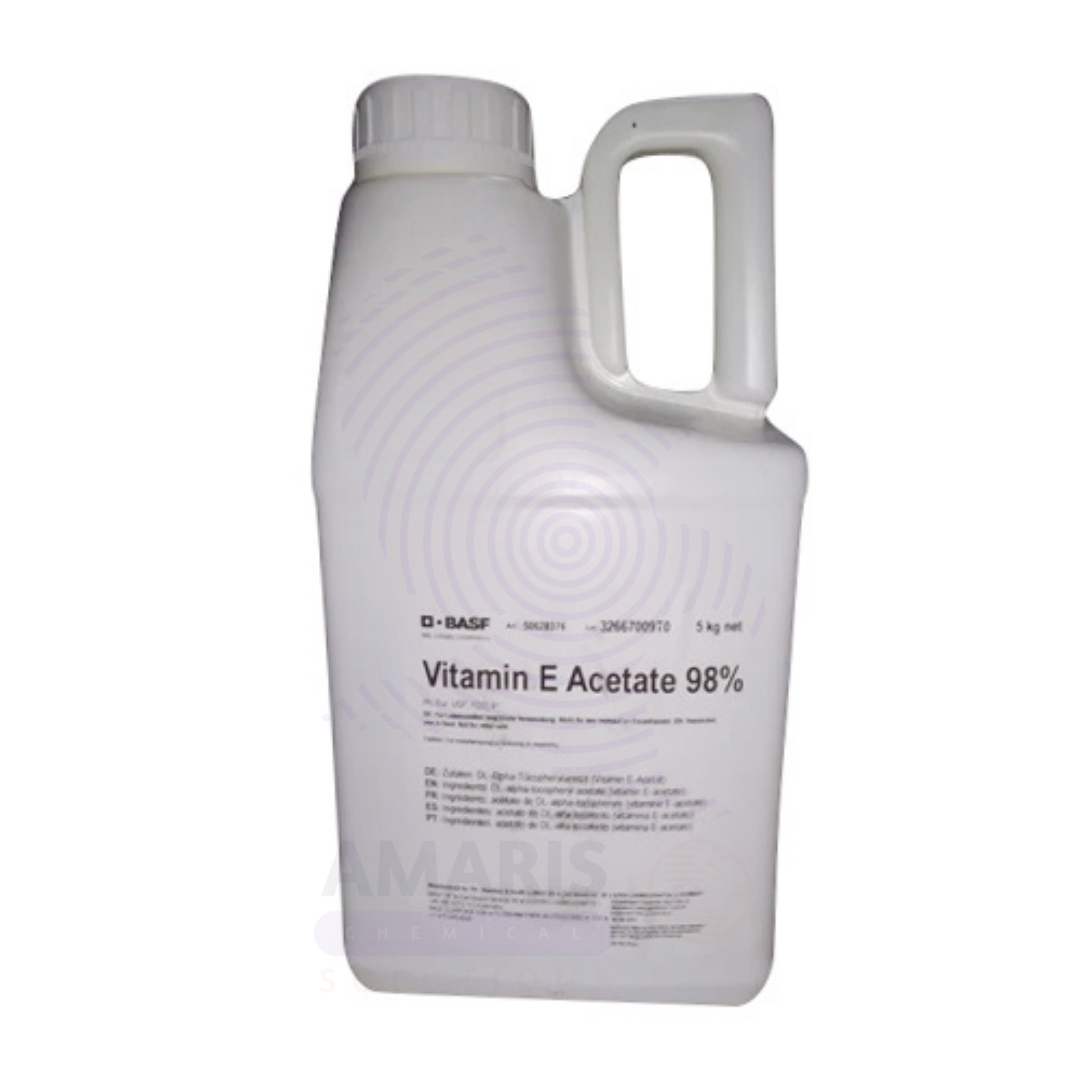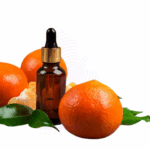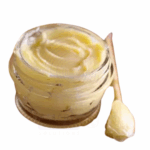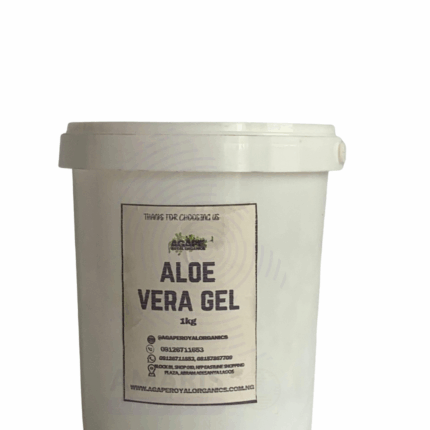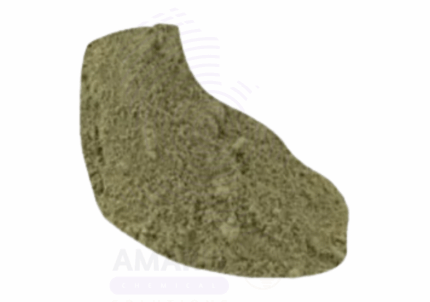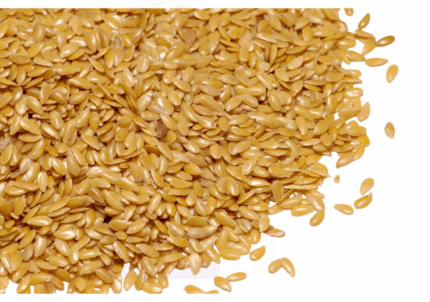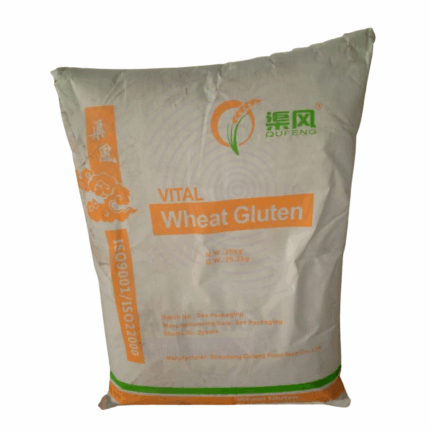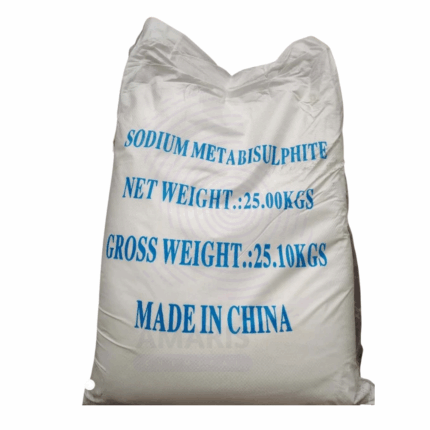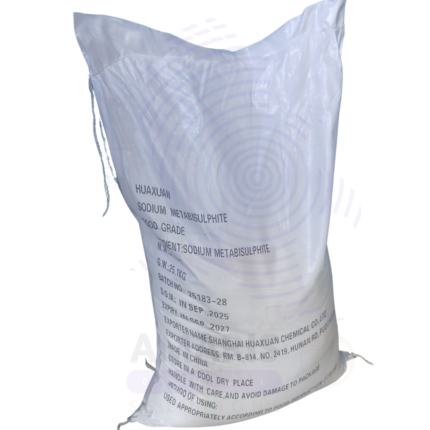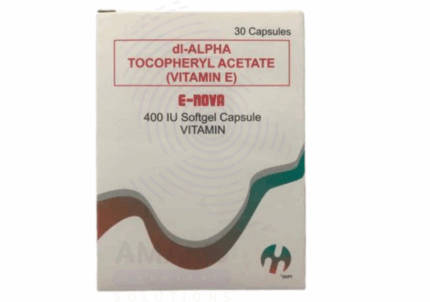Vitamin E Acetate Oily
Whatsapp Order
Vitamin E Acetate Oily, also known as DL-Alpha-Tocopheryl Acetate, is a synthetic, oil-soluble form of Vitamin E with high purity and exceptional oxidative stability. This viscous liquid is ideal for applications requiring direct incorporation into oil-based systems such as soft gel capsules, cosmetic formulations, and fortified edible oils. Its stability under processing and storage conditions makes it a preferred form of Vitamin E for nutritional, pharmaceutical, cosmetic, and food-grade applications.
Description
Table of Contents
Toggle
Vitamin E Acetate Oily
Primary Uses
- Pharmaceutical Industry
- Nutritional Supplements: Widely used in soft gel capsules for the treatment and prevention of Vitamin E deficiency.
- Parenteral Preparations: Employed in intravenous emulsions or nutrition blends as a lipid-soluble antioxidant.
- Therapeutic Support: Used in formulations for neurological, cardiovascular, and reproductive health.
- Combination Formulations: Incorporated with other fat-soluble vitamins (A, D, K) in multivitamin oil preparations.
- Nutraceuticals & Dietary Supplements
- Softgel Capsules: Preferred for high-potency, fat-soluble vitamin formulations.
- Immune Health & Antioxidant Blends: Included in formulations aimed at reducing oxidative stress and supporting immune function.
- Anti-Aging Support: Used in wellness supplements promoting skin and cellular health.
- Cosmetics & Personal Care
- Skin Care Products: Found in creams, lotions, and serums for moisturizing, skin healing, and anti-aging properties.
- Hair Oils & Conditioners: Added to nourish the scalp and protect hair from environmental damage.
- Sun Protection: Used in sunscreen products for its photoprotective and antioxidant benefits.
- Food Industry
- Edible Oil Fortification: Added to vegetable oils and margarine to enhance nutritional value and oxidative stability.
- Infant Formula: Used as a source of Vitamin E in oil-based infant nutrition systems.
- Dietary Fortification: Enriches dietary products such as spreads, supplements, and dairy emulsions.
Secondary Uses
- Veterinary & Animal Nutrition
- Pet & Livestock Nutrition: Added to animal feed oils and supplements to support reproduction, immunity, and muscular function.
- Topical Veterinary Use: Found in veterinary balms and ointments to support skin healing and recovery.
- Industrial Applications
- Polymer & Plastics: Occasionally used as a stabilizer to prevent oxidative degradation in certain polymer processes.
- Medical Device Coatings: Explored as a surface antioxidant in some specialty biomedical applications.
- Research & Development
- Antioxidant Studies: Used in biochemical studies on lipid oxidation, aging, and free radical activity.
- Encapsulation Trials: Used in R&D for developing encapsulated oil-soluble vitamin systems.
KEY PRODUCT FEATURES
1. Basic Identification Attributes
- Chemical Name (IUPAC): (±)-2,5,7,8-Tetramethyl-2-[(4,8,12-trimethyltridecyl)oxy]chroman-6-yl acetate
- Common/Trade Name: Vitamin E Acetate 98% Oily, DL-Alpha-Tocopheryl Acetate
- CAS Number: 7695-91-2
- HS Code: 2936.28.00
- Synonyms: Tocopheryl Acetate, Vitamin E Ester, Alpha-Tocopheryl Acetate Oil
2. Physical & Chemical Properties
- Physical State: Clear, viscous oily liquid
- Color & Odor: Pale yellow to amber; mild, characteristic odor
- Solubility: Insoluble in water; soluble in oils and organic solvents
- Purity: ≥98% DL-Alpha-Tocopheryl Acetate
- Molecular Formula: C31H52O3
- Molecular Weight: 472.75 g/mol
- Stability: Highly stable; resistant to oxidation and degradation under standard storage
3. Safety & Hazard Attributes
- GHS Classification: Not classified as hazardous
- Toxicity: Low toxicity at nutritional levels; high doses may interfere with vitamin K and cause anticoagulation
- Exposure Limits: No established workplace exposure limits
- Sensitization: Non-sensitizing under normal use
4. Storage & Handling Attributes
- Storage Conditions: Store tightly sealed in a cool, dry, and dark place
- Container Type: Amber glass bottles, HDPE drums, or nitrogen-purged steel containers
- Shelf Life: 36 months under proper storage conditions
- Handling Precautions: Protect from heat, air, and light during processing and storage
5. Regulatory & Compliance Attributes
- Complies with: USP, BP, EP, FCC standards
- Manufactured under: GMP, ISO 9001-certified facilities
- GRAS Status: Recognized as safe for use in food and dietary supplements
- Global Acceptance: Approved for use in human and animal products in most regulatory jurisdictions
6. Environmental & Health Impact
- Biodegradability: Readily biodegradable
- Ecotoxicity: Low toxicity to aquatic life
- Bioaccumulation: Negligible risk under normal use
SAFETY HANDLING PRECAUTIONS
Safety Handling Precautions
- PPE Required: Gloves, lab coat, and eye protection
- Handling Guidelines: Avoid prolonged skin contact and ensure good ventilation when transferring or blending
- Storage Measures: Keep container tightly closed and away from oxidizing agents
First Aid Measures
- Inhalation: Not expected to be hazardous; move to fresh air if irritation occurs
- Skin Contact: Wash with soap and water if irritation develops
- Eye Contact: Rinse cautiously with water for several minutes; remove contact lenses if present
- Ingestion: Rinse mouth; seek medical attention in case of large ingestion
Firefighting Measures
- Fire Hazards: Combustible liquid
- Extinguishing Media: Dry chemical, foam, CO₂, or water spray
- Hazardous Combustion Products: Carbon monoxide, carbon dioxide, and potential irritating vapors
Related products
Aloe Vera Gel
Aloe Vera Gel is a clear, jelly-like substance extracted from the inner leaf of the Aloe vera plant. It is widely used in skincare for its soothing, hydrating, and healing properties. Rich in vitamins (especially A, C, and E), enzymes, and amino acids, Aloe Vera Gel is commonly applied to treat sunburns, minor cuts, skin irritation, and dryness. It also has mild anti-inflammatory and antibacterial effects, making it a popular natural remedy in both cosmetic and medicinal products.
Ellagic Acid
Ellagic Acid is a naturally occurring polyphenolic compound found in numerous fruits, nuts, and vegetables such as pomegranates, strawberries, raspberries, walnuts, and cranberries. It is a potent antioxidant known for its ability to scavenge free radicals and chelate metal ions. Due to its significant anti-inflammatory, anti-carcinogenic, and anti-viral properties, Ellagic Acid has gained extensive interest in pharmaceutical, nutraceutical, cosmetic, and food industries. It appears as a yellow to light brown crystalline powder, insoluble in water but soluble in organic solvents like ethanol and DMSO.
Flax
Flax (Linum usitatissimum) is an ancient crop cultivated primarily for its seeds and fibers. The flax seeds are small, flat, and oval, ranging from golden yellow to brown in color, and are rich in nutrients including omega-3 fatty acids (alpha-linolenic acid), lignans, dietary fiber, proteins, and vitamins. Flax fibers are derived from the stem and used in textile and industrial applications. Flaxseed oil, extracted from the seeds, is highly valued for its nutritional and therapeutic properties. Flax is utilized across food, nutraceutical, cosmetic, pharmaceutical, and industrial sectors due to its multifunctional health benefits, fiber content, and sustainable nature.
Glycerin
$ 1.20
Glycerin, also known as glycerol, is a colorless, odorless, viscous liquid with a sweet taste and hygroscopic properties. It is a trihydroxy alcohol (triol) used extensively across food, pharmaceutical, cosmetic, and industrial applications. Food-grade glycerin is produced through hydrolysis, saponification, or transesterification of fats and oils, ensuring compliance with stringent purity standards. It is supplied in bulk (e.g., 250kg drums) for large-scale applications where non-toxic, biodegradable humectants or solvents are required. Glycerin is widely appreciated for its moisture-retaining ability, solubility, lubricity, and stabilizing properties.
High Gluten Wheat Flour
High Gluten Wheat Flour is a finely milled powder derived from hard wheat varieties known for their high protein content, typically ranging from 12% to 14.5%. This flour has a superior gluten-forming capacity which imparts strong dough elasticity and excellent gas retention properties. It appears as an off-white to pale yellow powder with a neutral to slightly nutty aroma. High Gluten Wheat Flour is prized in baking industries and food manufacturing for producing products with enhanced chewiness, volume, and texture. It is essential for applications requiring strong dough structure and resilience.
Sodium Metabisulphite
Sodium Metabisulphite is a white crystalline powder widely used as an antioxidant, disinfectant, and preservative. It dissolves readily in water, releasing sulfur dioxide, which acts as a powerful antimicrobial and antioxidant agent. This chemical finds broad applications in food processing, water treatment, pharmaceuticals, and industrial manufacturing to prevent spoilage, control microbial growth, and protect equipment from corrosion.
Sodium Sulphite (Blue)
Sodium Sulphite Blue is a white to bluish-white crystalline powder with the chemical formula Na₂SO₃. The “Blue” grade indicates a specific industrial quality often containing minor additives or impurities, used primarily in water treatment and chemical industries. It acts as an effective oxygen scavenger, reducing agent, and preservative. This 25kg packaged product is highly soluble in water, forming alkaline solutions, and is widely used in pulp and paper, water treatment, textile, and photographic industries.
Vitamin E Acetate (DL-Alpha-Tocopheryl Acetate)
Vitamin E Acetate (DL-Alpha-Tocopheryl Acetate), chemically known as DL-Alpha-Tocopheryl Acetate, is a stable, synthetic form of Vitamin E used widely in pharmaceuticals, cosmetics, food fortification, and dietary supplements. As an esterified form of tocopherol, it offers superior oxidative stability, making it ideal for formulations requiring extended shelf life. It functions as a potent antioxidant, protecting cells from oxidative damage and supporting immune and skin health.


 Preservatives(food)
Preservatives(food) Flavor Enhancers
Flavor Enhancers Acidulants
Acidulants Sweeteners
Sweeteners Antioxidants
Antioxidants Colorants(food)
Colorants(food) Nutraceutical Ingredients (food)
Nutraceutical Ingredients (food) Nutrient Supplements
Nutrient Supplements Emulsifiers
Emulsifiers
 Collectors
Collectors Dust Suppressants
Dust Suppressants Explosives and Blasting Agents
Explosives and Blasting Agents Flocculants and Coagulants
Flocculants and Coagulants Frothers
Frothers Leaching Agents
Leaching Agents pH Modifiers
pH Modifiers Precious Metal Extraction Agents
Precious Metal Extraction Agents
 Antioxidants(plastic)
Antioxidants(plastic) Colorants (Pigments, Dyes)
Colorants (Pigments, Dyes) Fillers and Reinforcements
Fillers and Reinforcements Flame Retardants
Flame Retardants Monomers
Monomers Plasticizers
Plasticizers Polymerization Initiators
Polymerization Initiators Stabilizers (UV, Heat)
Stabilizers (UV, Heat)
 Antifoaming Agents
Antifoaming Agents Chelating Agents
Chelating Agents Coagulants and Flocculants
Coagulants and Flocculants Corrosion Inhibitors
Corrosion Inhibitors Disinfectants and Biocides
Disinfectants and Biocides Oxidizing Agents
Oxidizing Agents pH Adjusters
pH Adjusters Scale Inhibitors( water)
Scale Inhibitors( water)
 Antioxidants(cosmetic)
Antioxidants(cosmetic) Emollients
Emollients Fragrances and Essential Oils
Fragrances and Essential Oils Humectants
Humectants Preservatives
Preservatives Surfactants(cosmetic)
Surfactants(cosmetic) Thickeners
Thickeners UV Filters
UV Filters
 Fertilizers
Fertilizers Soil Conditioners
Soil Conditioners Plant Growth Regulators
Plant Growth Regulators Animal Feed Additives
Animal Feed Additives Biostimulants
Biostimulants Pesticides (Herbicides, Insecticides, Fungicides)
Pesticides (Herbicides, Insecticides, Fungicides)
 Active Pharmaceutical Ingredients (APIs)
Active Pharmaceutical Ingredients (APIs) Excipients
Excipients Solvents(pharmaceutical)
Solvents(pharmaceutical) Antibiotics
Antibiotics Antiseptics and Disinfectants
Antiseptics and Disinfectants Vaccine Adjuvants
Vaccine Adjuvants Nutraceutical Ingredients (pharmaceutical)
Nutraceutical Ingredients (pharmaceutical) Analgesics & Antipyretics
Analgesics & Antipyretics
 Analytical Reagents
Analytical Reagents Solvents(lab)
Solvents(lab) Chromatography Chemicals
Chromatography Chemicals Spectroscopy Reagents
Spectroscopy Reagents microbiology-and-cell-culture-reagents
microbiology-and-cell-culture-reagents Molecular Biology Reagents
Molecular Biology Reagents Biochemical Reagents
Biochemical Reagents Inorganic and Organic Standards
Inorganic and Organic Standards Laboratory Safety Chemicals
Laboratory Safety Chemicals Specialty Laboratory Chemicals(Special Laboratory Equipment)
Specialty Laboratory Chemicals(Special Laboratory Equipment)
 Demulsifiers
Demulsifiers Hydraulic Fracturing Fluids
Hydraulic Fracturing Fluids Scale Inhibitors(oil)
Scale Inhibitors(oil) Surfactants(oil)
Surfactants(oil) Drilling Fluids
Drilling Fluids
 Dyes and Pigments
Dyes and Pigments Bleaching Agents
Bleaching Agents Softening Agents
Softening Agents Finishing Agents
Finishing Agents Antistatic Agents
Antistatic Agents
 Admixtures
Admixtures Waterproofing Agents
Waterproofing Agents Sealants and Adhesives
Sealants and Adhesives Curing Compounds
Curing Compounds Concrete Repair Chemicals
Concrete Repair Chemicals Anti-Corrosion Coatings
Anti-Corrosion Coatings
 Surfactants(cleaning)
Surfactants(cleaning) Builders
Builders Enzymes
Enzymes Solvents (Cleaning)
Solvents (Cleaning) Fragrances
Fragrances
 Electronic Chemicals
Electronic Chemicals Catalysts
Catalysts Lubricants
Lubricants Photographic Chemicals
Photographic Chemicals Refrigerants
Refrigerants Automotive chemicals
Automotive chemicals Pyrotechnic Chemicals
Pyrotechnic Chemicals
 Biodegradable Surfactants
Biodegradable Surfactants Bio-based Solvents
Bio-based Solvents Renewable Polymers
Renewable Polymers Carbon Capture Chemicals
Carbon Capture Chemicals Wastewater Treatment Chemicals
Wastewater Treatment Chemicals
 Pigments
Pigments Solvents(paint)
Solvents(paint) Specialty Coatings
Specialty Coatings Binders/Resins
Binders/Resins Additives
Additives Driers
Driers Anti-Corrosion Agents
Anti-Corrosion Agents Functional Coatings
Functional Coatings Application-Specific Coatings
Application-Specific Coatings
 Leavening Agents
Leavening Agents Dough Conditioners
Dough Conditioners Flour Treatments
Flour Treatments Fat Replacers
Fat Replacers Decoratives
Decoratives Preservatives(baking)
Preservatives(baking)
 Plasticizers & Softeners
Plasticizers & Softeners Reinforcing Agents
Reinforcing Agents Adhesion Promoters
Adhesion Promoters Vulcanizing Agents
Vulcanizing Agents Antidegradants
Antidegradants Blowing Agents
Blowing Agents Fillers & Extenders
Fillers & Extenders Accelerators & Retarders
Accelerators & Retarders